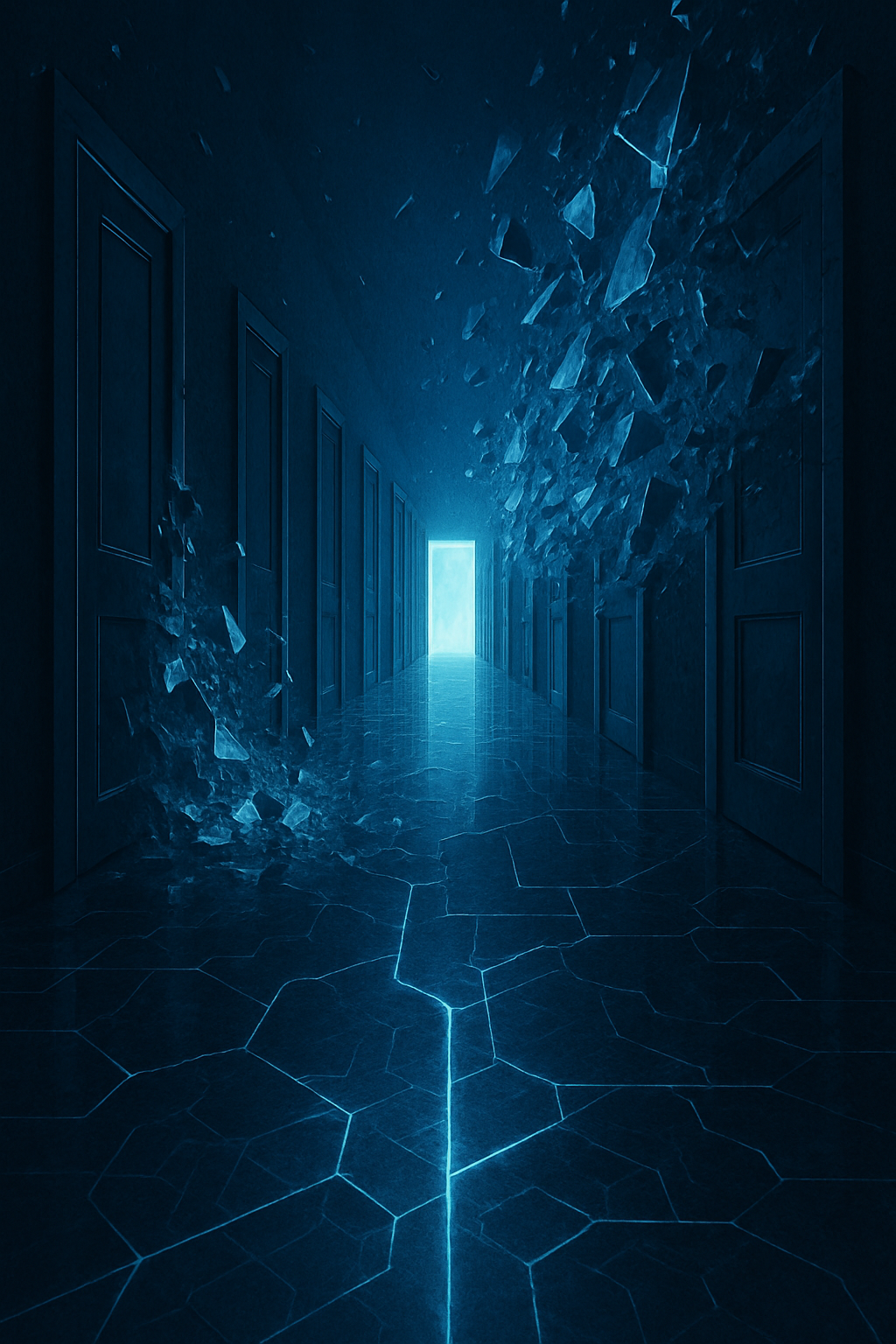Collapsing Unwanted Futures
There’s a moment before every decision where the hallway feels infinite, where every door seems solid and waiting, perfectly aligned like a series of promises you haven’t yet broken, and for a time you believe you can linger there, circling slowly, peering through keyholes, and imagining every possible room in perfect detail before you decide where to step. But hesitation carries its own weight, and the longer you wait, the more the shapes begin to blur; what you thought you saw through the keyholes distorts, edges dissolve, and certainty slips away even as you try to reach for it.
We like to believe pausing buys us clarity, but the hallway doesn’t wait. Even when you stand perfectly still, the architecture rearranges itself without you — doors locking softly, others vanishing entirely, and whole paths twisting into unfamiliar shapes you won’t recognize later. Futures slip out of reach quietly, not with ceremony, but with the subtle finality of something erased before you’ve even noticed it’s gone.
This is the hidden cost of standing still: possibility isn’t preserved, it’s consumed. We think delaying protects us from consequence, that waiting suspends the moment until we’re ready to act, but it doesn’t. Unchosen futures decay out of sight, and by the time you decide, you’ve already become someone who no longer belongs to half the rooms you were weighing so carefully.
When you finally step forward, it feels small, almost harmless, but in that motion entire lives vanish in an instant. Every door you didn’t open collapses at once, not into regret, not even into memory, but into nothing at all. And this is where speed matters, not because it guarantees correctness, but because it spares you the slow drag of futures dying one by one while you watch.
A fast decision collapses the hallway cleanly. It burns away the noise before you can multiply it into a thousand competing versions of yourself, each pulling in a different direction, each imagining a separate life you’ll never live. Momentum doesn’t just carry you forward — it frees you from the weight of infinite phantom selves pressing in behind you.
We call speed recklessness, but maybe it’s closer to clarity than it seems. Acting quickly sharpens the world around you; the room you’ve chosen resolves into focus, and for the first time, you know where you are. You still don’t know if it’s right, but right isn’t what makes it real — action does.
And yet, the doors have a way of resurfacing. Not all of them, and not all at once, but in quiet hours years later, you’ll catch the edge of one you didn’t open, flickering at the corner of memory. For a moment, you’ll imagine stepping through it, touching the life that might have been, and the thought will linger longer than you expect.
But the harder you try to rebuild it, the more it dissolves. You realize it belonged to someone you no longer are, to a version of yourself that disappeared the moment you moved. Those rooms were never waiting; they were carried off with the person who would have entered them. The hallway you left behind doesn’t exist anymore.
This is the truth buried beneath every decision: you’re not just choosing what comes next — you’re choosing which possibilities won’t survive. Identity isn’t something discovered whole behind one perfect door; it’s shaped by subtraction, by silencing the futures that don’t belong to you so the one ahead has space to take form.
We speak of freedom as if it’s keeping every door open, but that isn’t freedom, it’s paralysis. Endless potential weighs you down until movement feels impossible. The relief comes when you begin to let the wrong doors collapse without ceremony, when you stop carrying futures that were never yours to live.
Choosing is destruction, but not ruin. Each decision narrows what’s possible, but it also clears what isn’t, and in that clearing there’s space to move, space to become, space to breathe. It isn’t control, and it isn’t certainty — it’s the quiet acceptance that reality sharpens by collapsing what you won’t choose.
And as you walk, you understand that action is less about knowing where you’re going and more about allowing where you’re not to disappear. The hallway shortens with every step, the noise fades, and though you don’t know what waits in the next room, you keep moving anyway.
You walk not to escape uncertainty but to destroy it, leaving the doors you’ll never open to vanish behind you, and in that narrowing, you finally make enough space to live inside what remains.

